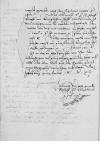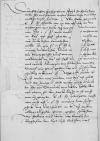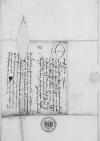Dem durchlauchten, hochgebornen fursten und herren, hern ⌊Albrechten⌋, von Gots gnaden marggraff zu ⌊Brandenburg⌋, in ⌊Preussen⌋, / zu ⌊Stetin⌋, / ⌊Pomern⌋, / der ⌊Cassuben⌋ und ⌊Wenden⌋ / hertzog, / burggraff zu ⌊Nurmberg⌋ und furst zu ⌊Rugen⌋, / unserm hochgunstigen, lieben herren und freunde
Durchlauchter, hochgeborner furst, hochgunstiger, lieber her und freundt. / Unsere freuntliche und vleis willige dinste zuvoran. /
Wir haben gerne aus Ewer Furstlichen Durchlaucht ⌊⌋, / den IX dits m[on]dts an uns ausgangen, / und diesen tag uns ge[wor]den, / vornommen, / das Ewer Furstliche Durchlaucht unser einfel...d wolgemeint an ⌊kayserlicher maiestet⌋ hoff schreiben / g..., / welchs wir aus sonderlichem freuntlichem ...tlichem willen, / den wir zu Ewer Furstlichen Durchlaucht tr...icht haben mugen underlassen, / domit / w...se sache mit dem kamergerichte durch uns vor...n gehandelt, / widderumb an keyserlicher maiestet hoffe vor...et und erinnert wurde, / derwegen uns zu dan[c]ken unnottig, / dieweil wir gerne gethan, / das wir zuthun uns schuldig erkennen / etc. Wÿe aber fordan Ewer Furstliche Durchlaucht unsern rath furdern, / was ⌊keyserlicher maiestet⌋ gleitt / und das jenige, so beide unsere guthe freunde, der her von ⌊Granuela⌋ / und doctor ⌊Heldt⌋, / dem wir etwan zu dem stande, / dorin er ist nicht unnutz gewesen, / Ewer Furstliche Durchlaucht zuentpoten, / wisse wir nicht uff Ewer Furstlichen Durchlaucht antwurt, inen zugeschickt, / und das schreiben, / an ⌊konigliche maiestet⌋, unsern allergnedigisten herren, / gethan, / zubessern. / Wir haltens auch dovor, / das koniglichem botschafter, / dem diese sache bevolhen, / nach werde gesendt, / was im hirinne weiter zuthun. / Das abermals Ewer Furstliche Durchlaucht scharffe brieffe von koniglichem hoffe uberkommen, / ist unvorborgen, / wie die werden ausgebracht, / der[h]alben wir uns mit weiterm anzeigen enthal[te]n, / weil Ewer Furstliche Durchlaucht antwort gnugsam zur sachen [be]richt etc. Nichts wenigers wolle wir solchs ...glicher weiss an gute freunde koniglichs hof... lassen gelangen etc. Hiemit wir Ewer [Furstlichen] Durchlaucht in dieser heyligen zeit / von Got dem almechtigen vil glugseliger, gesunder zeitt / und alles, das dem leibe und der seelen gut ist, / trewhertziglich wunschen und bitten. /
⌊Ioannes⌋, von Gots gnaden bischoff zu ⌊Ermelandt⌋ /
qui supra manu propria subscripsit


